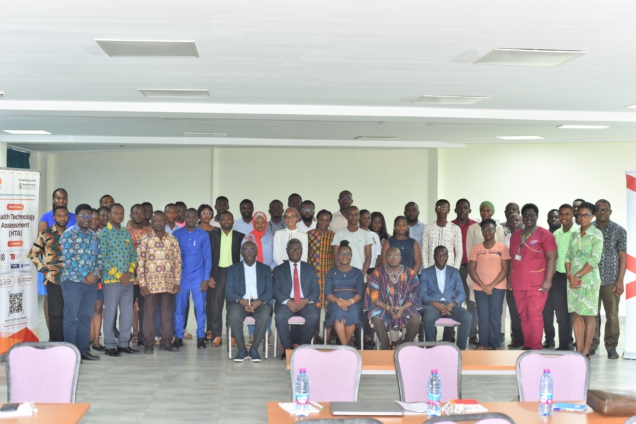Limited resources for the health sector in Low and Middle Income Countries (LMICs) require the use of appropriate technologies and innovations to influence priority setting and guide coverage decisions in a bid to attain Universal Health Coverage by 2030.
Health Technology Assessment (HTA) allows a critical assessment of health technologies as a basis for making evidence-based decisions in the health sector.
The use of HTA in Ghana and Africa at large is low and therefore, the need for capacity building for efficient utilization of limited resources in the sector.
Thirty (30) healthcare professionals are therefore benefiting from a Health Technology Assessment short course by the KNUST Africa Higher Education Health Collaborative in partnership with the Mastercard Foundation.
The participants are health professionals, health managers, policy makers, civil servants and researchers working at the primary Health Care level in Ghana.
Prof. Anthony Edusei of KNUST School of Public Health who read the speech of the Principal Investigator of KNUST Africa Higher Education Health Collaborative, Prof. Ellis Owusu-Dabo, is optimistic the 5-day workshop will maximize the gains in the health sector.
“Through this critical assessment we can make evidence-based decisions, potentially contributing to appropriate and efficient use of resources, thus achieving value for money in respect of investments in health care provision.
“This modular short course is therefore being organized for healthcare professionals so that their capacity in the use and application of HTA at the Primary Health Care level can be enhanced,” he said.
The course is under the aegis of the Health Employment pillar of the Africa Higher Education Health Collaborative.
The pillar lead, Dr. Kofi Akohene Mensah, said the course has been accredited by various health professional bodies for Continuous Professional Development (CPD) points.

The partners in the workshop include: KNUST School of Public Health, The DAAD-PAGEL (German Academic Exchange Service Partnership for the Health Sector in Developing Countries) Accelerating Capacity-Building in Health Systems Research and Management in Africa Project, and the German-West African Centre for Global Health and Pandemic Prevention (G-WAC)
The rest are: The Department of Health Care Management at the Technische Universitat Berlin (TUB), Germany, the Norwegian Institute of Public Health, Norway, and the HTA Secretariat of the Ministry of Health, Ghana.
Latest Stories
-
Dining with the Gods… Hands off the Big Chair
31 minutes -
Joy FM’s Party in the Park: A day of family fun awaits in Aburi
32 minutes -
Mahama urged to stand firm against lobbyists in appointments
41 minutes -
SEED Academy Ghana to hold elite Basketball Camp and Leadership Summit on December 26
47 minutes -
Kofi Asare criticises delays in Free SHS and WASSCE funding
51 minutes -
KNUST Medical School targets expansion of teaching facilities to accommodate more students
52 minutes -
WAFU B U-17 Girls Cup: Black Maidens duo pick up top awards in inaugral edition
1 hour -
International Day for PWDs: Telecel Ghana Foundation trains deaf students in robotics
1 hour -
Kasia Coal releases holiday anthem ‘Feliz Navidad’
1 hour -
American Airlines grounds all US flights on busy Christmas Eve
2 hours -
UNICEF urges Ghana to prioritise TVET investment to address youth unemployment
2 hours -
Businessman to plead guilty in NY Mayor Adams’ corruption case
2 hours -
Black Sherif stamps authority with aura as high as his shoulder pads at ‘Zaama Disco’ concert
2 hours -
Let go AFCON qualification woes and back Black Stars in World Cup qualifiers – Joseph Paintsil
2 hours -
The US town where it’s the law to own a gun
2 hours

